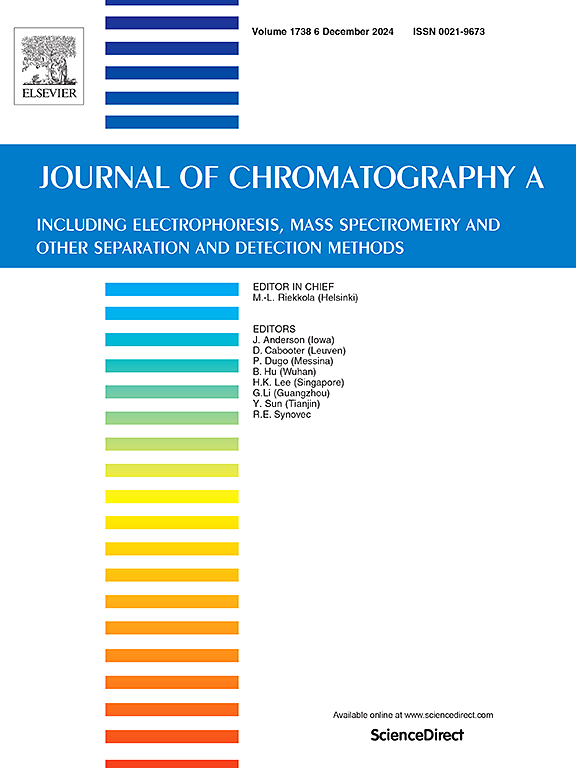A modeling method based on incomplete mixed cells in counter-current chromatography: Interphase mass transfer ratio
IF 3.8
2区 化学
Q1 BIOCHEMICAL RESEARCH METHODS
引用次数: 0
Abstract
Complex mass transfer processes are highly involved in the performance of counter-current chromatography (CCC), so profound exploration should be conducted to improve the overall performance. To more accurately estimate the interphase mass transfer efficiency in the elution process, this study proposes an incomplete mixed cell model by linking layering-mixing-layering behavior and wave-like mixing. With the model, we proposed a fast estimation algorithm for interphase mass transfer ratio (IMTR), which can independently reflect the magnitude of the interphase mass transfer efficiency. The experimental results show that the IMTR of all samples was relatively small, with an average value of not >10 % under different operating conditions. This indicates that the low column efficiency of CCC may be mainly due to the low efficiency of interphase mass transfer. In addition, by analyzing the influencing factors of IMTR, it is found that IMTR is positively correlated with the number of theoretical plates and the retention of stationary phase (Sf), but negatively correlated with the number of incomplete mixing cells (n). Therefore, in the study of column efficiency optimization, we recommend that the distribution ratio, Sf, and n should remain unchanged in control experiments to ensure that IMTR directly reflects the effect on interphase mass transfer efficiency. This study further completes the evaluation index of the CCC column efficiency, revealing the underlying mechanisms of IMTR on column efficiency and providing a theoretical foundation for future research on high-efficiency CCC.
基于逆流色谱中不完全混合池的建模方法:相间传质比
复杂的传质过程与逆流色谱(CCC)的性能密切相关,因此需要进行深入探索以提高其整体性能。为了更准确地估算洗脱过程中的相间传质效率,本研究将分层-混合-分层行为与波状混合联系起来,提出了一种不完全混合池模型。利用该模型,我们提出了相间传质比(IMTR)的快速估算算法,该算法可独立反映相间传质效率的大小。实验结果表明,在不同的操作条件下,所有样品的相间传质比都相对较小,平均值不大于 10%。这表明,CCC 柱效低的主要原因可能是相间传质效率较低。此外,通过分析 IMTR 的影响因素,发现 IMTR 与理论板数和固定相保留率(Sf)呈正相关,但与不完全混合池数(n)呈负相关。因此,在柱效优化研究中,我们建议在对照实验中保持分配比、Sf 和 n 不变,以确保 IMTR 直接反映相间传质效率的影响。本研究进一步完善了 CCC 柱效率的评价指标,揭示了 IMTR 对柱效率影响的内在机理,为今后高效 CCC 的研究提供了理论基础。
本文章由计算机程序翻译,如有差异,请以英文原文为准。
求助全文
约1分钟内获得全文
求助全文
来源期刊

Journal of Chromatography A
化学-分析化学
CiteScore
7.90
自引率
14.60%
发文量
742
审稿时长
45 days
期刊介绍:
The Journal of Chromatography A provides a forum for the publication of original research and critical reviews on all aspects of fundamental and applied separation science. The scope of the journal includes chromatography and related techniques, electromigration techniques (e.g. electrophoresis, electrochromatography), hyphenated and other multi-dimensional techniques, sample preparation, and detection methods such as mass spectrometry. Contributions consist mainly of research papers dealing with the theory of separation methods, instrumental developments and analytical and preparative applications of general interest.
 求助内容:
求助内容: 应助结果提醒方式:
应助结果提醒方式:


